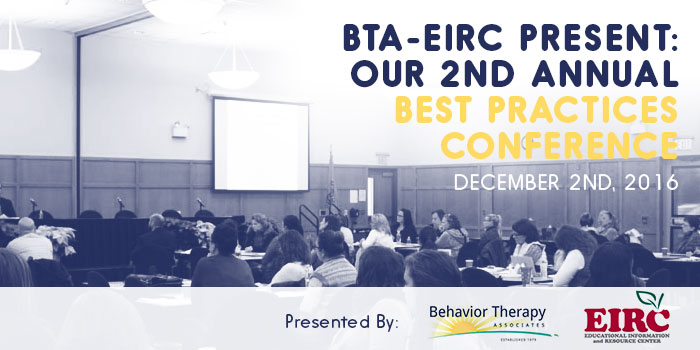Best Practices For Improving Classroom Management, Social Skills, Behavior and Instructions for Children with Special Needs
Behavior Therapy Associates and EIRC welcomed teachers, school administrators, parents and psychologists to their 2nd Annual “Best Practices” Conference. During the full day conference, attendees were given a chance to attend keynote presentations, breakout sessions, and Q&A’s, all of which were led by our experienced clinicians staff of industry experts. Our 2nd Statewide Conference was held at the Foundation for Educational Administration (FEA) and covered a wide variety of topics including child behavior management, understanding and treating anxiety, social emotional learning, including students with autism spectrum disorders, and more!

Conference Highlights
Steven Gordon and Michael Selbst opened up our 2nd Annual Conference with an overview of what would be covered during the duration of the “Best Practices” conference. Dr. Gordon and Dr. Selbst discussed the importance of Acceptance and Commitment Therapy / Training (ACT) and applications for participants, their colleagues, and individuals with whom they work.
Social Emotional Learning & Common Core
During the first session of the conference, presenters Michael Selbst and Rory Panter shared expert advice on how educators and parents can improve school culture, school climate, and student character through social emotional learning. Social emotional learning (SEL) is the process through which children and adults acquire and effectively apply the knowledge, attitudes, and skills necessary to understand and manage emotions, set and achieve positive goals, feel and show empathy for others, establish and maintain positive relationships, and make responsible decisions.
Attendees learned how to incorporate SEL within the daily activities in a classroom setting and throughout the day. Dr. Panter, Licensed Psychologist, shared insightful ideas such as how the staff members’ emotional responses directly affect students’ emotions. With extensive experience treating children with social skills deficits and disruptive behavior disorders, Dr. Panter urged educators to demonstrate the very behaviors and emotional responses expected of students. She related that educators who model their own feelings to students will improve the character of students and build positive relationships within the classroom.
Dr. Selbst, Director of Behavior Therapy Associates, added that the success of SEL learning initiatives hinges on the collective effort of school staff, students, and families. Furthermore, research indicates that SEL improves test scores an average of 11 points, which is another compelling reason to incorporate SEL in schools. Dr. Selbst also shared some of the most recent legislation regarding SEL and how educators can support legislation that will benefit students.
Child Behavior Management: Positive Approaches for Successful Learning
Amy Golden and Glenn Sloman teamed up to share practical tips on how to effectively manage challenging behaviors within and outside the classroom. Mrs. Golden, a Board Certified Behavior Analyst (BCBA), stressed the importance of providing students with the opportunity to respond. Using several methods, she taught attendees how they can encourage class engagement and participation. She also encouraged educators to respond with positive or corrective feedback that will propel students to learn more in a friendly environment.
Meanwhile, Dr. Sloman (BCBA, Nationally Certified School Psychologist, and Licensed Psychologist) engaged attendees in an open discussion on potential antecedents that may be negatively impacting student participation and behavior.
They both shared strategies on how educators can properly measure the effect of behavior management strategies and common errors within classroom management.
Including Students with Autism Spectrum Disorder into the General Education
One common issue among educators is the treatment of students with Autism Spectrum Disorder (ASD). Presenters, Rita Gordon and Elena Zaklis (both of whom are BCBAs) taught attendees how they can be successful and help students diagnosed with ASD. They helped educators effectively plan, maximize resources, and incorporate peer modeling in order to help students get the most out of their early education. Important supports and strategies were shared to promote successful inclusion of students with ASD within the general education setting.
Understanding & Treating Anxiety
Steve Gordon and Debra Salzman paired off to instruct educators how to assess and treat individuals with anxiety-related disorders. Some of the more common disorders include separation anxiety, social phobia, panic disorder, and obsessive compulsive disorder. Dr. Gordon and Dr. Salzman (Licensed Psychologists) elaborated on ways educators could identify common symptoms and effectively intervene.
“We all experience anxiety, there is nothing wrong with me.” -Steve Gordon
Dr. Gordon shared some of the most common symptoms of anxiety-related disorders. Some telltale signs include impaired peer relations, attention issues, and social neglect among peers. Because anxiety is an internalized disorder, educators were urged to understand early signs and were given helpful tips on treatment.
Part of the workshop also included the parents’ role with anxiety-prone children. Participants were instructed how students can have a genetic predisposition to anxiety and how parents may be negatively reinforcing certain behaviors. Through a variety of methods, Dr. Gordon and Dr. Salzman taught educators how they can keep parents in the loop and help students successfully manage their anxiety.
Q & A with the Behavior Therapy Associates Staff
Following a delicious lunch and a second round of workshops, everyone met back in the main conference room for a Q & A with the entire BTA staff. During the panel discussion, staff discussed best practices for generalization of skills and then answered questions related to the workshops and expanded upon some of the topics that were discussed.
At the end of the conference, professional development certificates were provided to attendees. Participants were also eligible to receive continued education credits through the Behavior Analyst Certification Board’s (BACB) since BTA is an approved continuing education (ACE) provider.
If you are an educator, parent or private practitioner, we encourage you to register for our next session. Please visit our Events Calendar to see our upcoming workshops or get the latest updates by signing up to our weekly newsletter.



